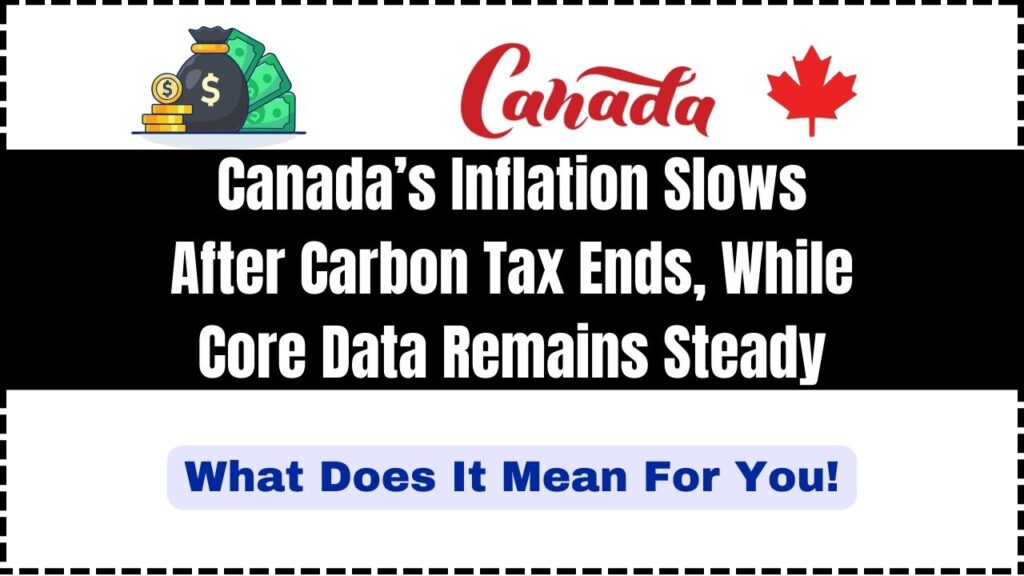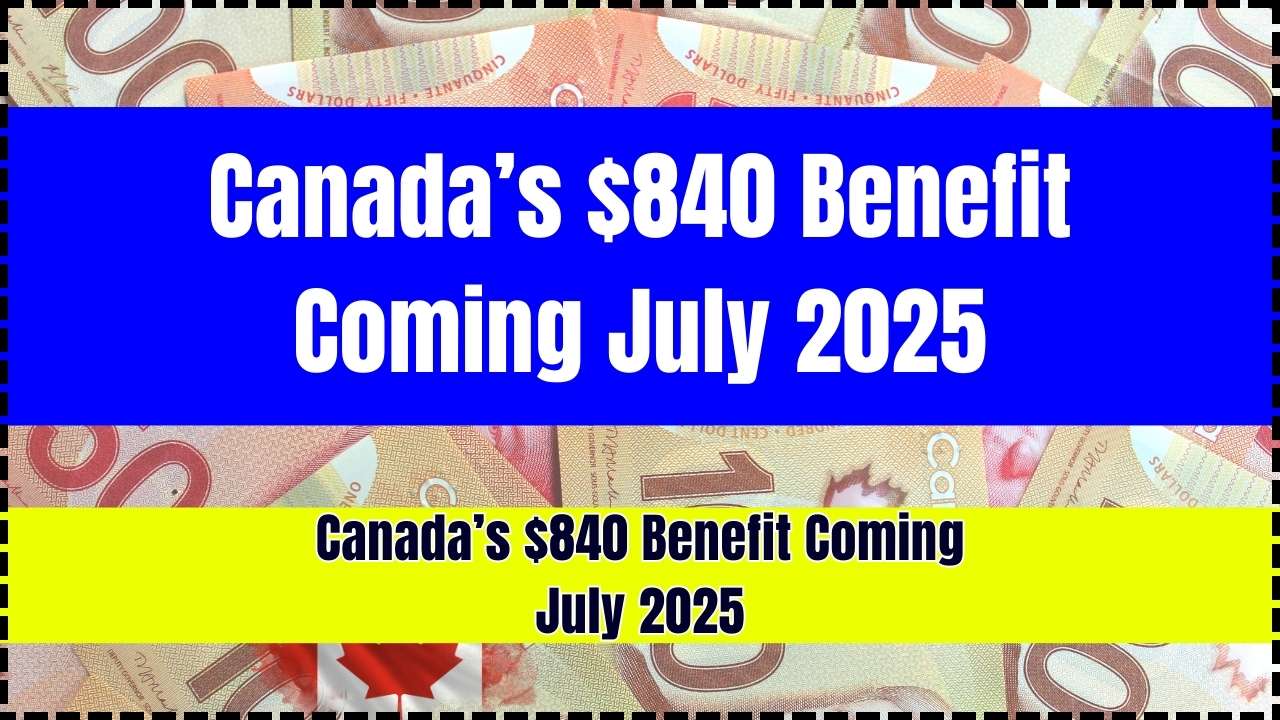
Canada’s Inflation Slows After Carbon Tax Ends: When Canada’s inflation rate dropped to 1.7% in April 2025, many folks—from suburban families to financial analysts—started paying attention. Why the buzz? This sudden slowdown came right after the government eliminated the federal carbon tax, giving energy prices a major haircut. But while gas got cheaper, your groceries, rent, and phone bill? Still climbing. In this article, we’ll break down what this shift in inflation really means for you, your family, and your bottom line—whether you’re managing a household budget or a business P&L.
Canada’s Inflation Slows After Carbon Tax Ends
Canada’s inflation drop is good news on paper — but dig deeper, and the story’s more complex. Energy costs fell with the end of the carbon tax, helping ease the financial burden for many. But core inflation remains stubborn, and that could delay interest rate cuts and keep household costs high. Now’s the time to stay smart, stay prepared, and stay informed.
| Topic | Details |
|---|---|
| Headline Inflation Rate (April 2025) | 1.7% (down from 2.3% in March) |
| Core Inflation | CPI-Median: 3.2%, CPI-Trim: 3.1% |
| Energy Price Impact | Gasoline down 14%, Natural Gas down 9.5% |
| Cause of Price Drop | Elimination of federal carbon tax |
| Interest Rate Impact | Rate cuts likely delayed until late 2025 |
| Official Source | Statistics Canada |
What’s Going On with Canada’s Inflation?
Inflation is simply the rate at which prices for goods and services rise over time. The Consumer Price Index (CPI) tracks these changes month-to-month. In April 2025, Canada’s CPI showed inflation slowed to 1.7%, its lowest since early 2021.
So, what changed?
The federal government scrapped the carbon tax, which had added a fee on fuels like gasoline and natural gas. That move led to a 12.7% overall drop in energy prices. Lower energy costs ripple out to other areas, like shipping and manufacturing, reducing pressure on prices temporarily.
But don’t let the headline number fool you.
Why Core Inflation Still Matters?
Core inflation removes things that bounce around a lot—like fuel and food—and gives us a steadier view of long-term trends. In April:
- CPI-Median rose to 3.2%
- CPI-Trim rose to 3.1%
These figures are the highest since March 2024, and they show that prices for services, housing, and everyday essentials are still going up.
So, while filling your tank might cost less, your rent, daycare, and dental appointments probably cost more than last year.
What is the Carbon Tax and Why Was It Removed?
The carbon tax was a federal policy aimed at reducing greenhouse gas emissions by making carbon-heavy fuels more expensive. It added a few cents per liter to gasoline and heating fuel. The government repealed it in April 2025, citing:
- Rising cost-of-living pressures
- Political pressure from provinces
- Energy affordability for rural and working-class Canadians
Example:
Before repeal – Filling a 60-liter gas tank: CAD $96
After repeal – Same tank: CAD $84
This change helped lower energy bills across the country, but it’s a one-time drop—not a long-term fix.
A Look at Inflation Over Time
Let’s put April 2025 in perspective:
| Month | Headline Inflation | Core Inflation |
|---|---|---|
| April 2023 | 4.3% | 3.9% |
| April 2024 | 2.9% | 2.7% |
| March 2025 | 2.3% | 3.0% |
| April 2025 | 1.7% | 3.2% |
You can see headline inflation trending down. But core inflation is holding steady—or even rising—which tells us price pressures aren’t over.
How Does Canada Stack Up Internationally?
| Country | Latest Headline Inflation |
|---|---|
| United States | 2.2% (April 2025) |
| Eurozone | 2.4% |
| Canada | 1.7% |
Canada’s inflation drop is significant, but core rates in all these countries are still above central bank targets, meaning policy tightening or delays in interest rate cuts are still likely.
What the Experts Are Saying
“While energy price relief will be welcomed by consumers, sticky core inflation suggests that the Bank of Canada should tread carefully with rate cuts,” said Avery Shenfeld, Chief Economist at CIBC.
“This is a political win for affordability, but economically, we still have structural price pressures,” added Frances Donald, Chief Economist at Manulife Investment Management.
Social Impact of Canada’s Inflation Slows After Carbon Tax Ends: Who Benefits, Who Struggles?
Winners:
- Rural households who drive more and rely on gas heating
- Trucking and logistics businesses
- Lower-income households with high energy bills
Strugglers:
- Urban renters with high housing costs
- Small businesses facing high borrowing rates
- Middle-class families squeezed by core price inflation
Will Interest Rates Go Down Soon?
Not likely. The Bank of Canada’s key interest rate sits at 4.5%. Markets had priced in a possible rate cut for summer, but sticky core data may delay that move to fall or even winter 2025.
Borrowing will likely stay expensive for now:
- Mortgages: Fixed rates remain above 5%
- Business Loans: Still tight and pricey
- Lines of Credit: No relief expected soon
How to Stay Ahead: Practical Tips
Rework Your Budget
Use tools like Budget Planner from the Government of Canada to revise monthly spending, focusing on core categories.
Lock In Fixed Rates
If you’re renewing a mortgage, shop early and consider a fixed-rate to avoid future hikes.
Invest in Efficiency
Make your home more energy-efficient.
Don’t Panic-Sell Investments
Inflation periods are tricky. Stay diversified and focus on long-term gains.
What Could Happen Next?
Keep your eye on:
- Bank of Canada rate announcements
- Employment trends (wage growth fuels inflation)
- Federal budget policies, especially new stimulus or spending cuts
Policymakers are in a tight spot. They want to ease pressure on families without sparking another inflation spike.
Canada Child Benefit Arrives Next Week: Check Payout Amount Quebec Parents May Receive!
May 20 Canada Child Benefit: Check If You’re Eligible for the New Payment
Frequently Asked Questions (FAQs)
Is inflation under control in Canada?
Headline inflation is falling, but core inflation shows the battle isn’t over.
Why are my grocery bills still so high?
Food prices are driven by global supply chains, weather, and shipping—not just domestic energy costs.
Should I wait to buy a house?
If rates stay high, prices may soften. But timing the market is risky. Talk to a mortgage broker.
What’s the outlook for small business owners?
Fuel costs down = good. But loans and leases remain expensive due to high rates.
How can I track inflation at home?
Use the Statistics Canada CPI Dashboard to monitor inflation by category.






